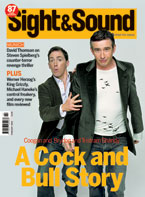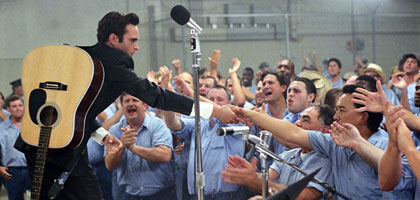Primary navigation

Germany/USA 2005

Reviewed by Mark Kermode
Our synopses give away the plot in full, including surprise twists.
1968, Folsom Prison, California. As his band jams, Johnny Cash reminisces backstage.
Dyess, Arkansas, 1944. While young John Cash ?shes, his brother Jack is killed in a sawmill accident.
Landsburg, Germany, 1952. The enlisted Cash phones his sweetheart Vivian, and starts to compose songs.
Memphis, 1955. Now married with kids, Cash and the Tennessee Two audition and cut 'Folsom Prison Blues' for Sun Records' Sam Phillips. On tour with fellow Sun artists (including Elvis and Jerry Lee Lewis), Johnny falls for married singer June Carter. In 1956, June is divorced and Cash reaches number 14 in the US charts. Two years later, Johnny publicly woos June on stage, to her disdain, but descends into drunkenness and pill-popping. Following a row, he writes and records 'I Walk the Line'. News of June's new marriage provokes more bingeing.
1964. Johnny persuades June to tour again, and their affair rekindles, but the tour is cancelled when Johnny collapses onstage, and is later busted for drugs. Johnny buys a lakeside house in Hendersonville, North Carolina, where June helps him to dry out. After receiving fan letters from prisoners, Johnny performs at Folsom Prison, creating a hit live LP.
February 1968. Johnny proposes to June onstage; she accepts. They remain married till their deaths in 2003.
All pop biopics inevitably face the challenge of dramatising the moment when the star stumbles upon their most famous hit. The degree to which this scene manages to side-step toe-curling cringe-worthiness is a fairly reliable indicator of the film's accomplishments and/or shortcomings. Compare, for example, the unintentionally laughable moment in Oliver Stone's bloated biopic The Doors when the band take a breather while Ray Manzarek 'perfects' the keyboard break from 'Light My Fire', with the far lighter touch of Steve Rash's The Buddy Holly Story, in which the car-bound Crickets decide to rework the lyric "if you knew... Cindy Lou" to incorporate the name of a band member's girlfriend, Peggy Sue.
The Johnny Cash biopic Walk the Line boasts not one but three such die-casting moments in which writer/director James Mangold risks death by ridicule. The ?rst has Johnny (Joaquin Phoenix, in career-best form), watching the 1951 movie Inside the Walls of Folsom Prison, and promptly penning the line "I shot a man in Reno just to watch him die", which ?ows unbidden from his troubled soul. Scenes two and three feature Cash's longtime muse June Carter (Reese Witherspoon) telling a drunken Johnny that he's going to blow a tour because he "can't walk no line", and later privately lamenting the wretched state ("it burns, burns...") in which her angst-ridden soulmate ?nds himself. The fact that none of these scenes raises even a titter (they provoke instead both smiles and tears) speaks volumes about the solid dramatic achievements of Walk the Line, which ranks alongside the Loretta Lynn movie Coal Miner's Daughter and Rash's previously cited Buddy Holly ?lm as one of the very best products of this oft-maligned genre.
Like Sissy Spacek and Gary Busey (the stars of the Lynn and Holly biopics), Phoenix and Witherspoon bene?t immeasurably from having the musical chops to master their characters' vocal performances. While the Killer himself once allegedly told the musically talented Dennis Quaid (the lead in 1989's Great Balls of Fire!) "son, you just can't sing like Jerry Lee", most accomplished performers sensibly baulk at miming hits for the simple reason that doing so would inevitably disrupt any genuine sense of character continuity. In the case of Cash, whose early life is (correctly) portrayed here as an endless tour-bus hike between damnation and redemption (in seeming con?rmation of Jerry Lee's manic insistence that "we're all going to hell"), the uniformity of Johnny's talking and singing voices is essential. Somehow (aided by electronic enhancement, perhaps) Phoenix handles the transition from faltering baritone to growling basso profondo brilliantly, his voice dropping deep into his boots as Johnny's soul descends into the ring of ?re. It's a sound that, as June observes, is "steady as a train, sharp as a razor", prompting Johnny's response that the band would "play faster... if we could". From the crackly incompetence of his fumbling audition for Sam Phillips with "two mechanics who can't hardly play", to the growling menace of his 'man in black' persona from whose rumbling larynx issued forth the voice of death, Phoenix manages the exact stance (hoiked shoulders, ri?e-guitar), gait (uncertain, yet unstoppable) and sheer derailed presence of a man who lived his life as if on his way to a funeral ("maybe I am", Johnny repeatedly opines). Standing ovations, too, for Witherspoon, who has perhaps the tougher task of lending depth and darkness to the role of June, whose frighteningly chipper stage act - a musical-comedy hybrid - constantly courts (but never marries) mockery. Like Phoenix, Witherspoon's performance is pitch perfect, even when buried beneath a (historically accurate) mass of hair and make-up.
With its central guilty motif of a lost sibling (Robert Patrick's fearsome father grimly declares that God "took the wrong son"), Walk the Line invites inevitable comparison with last year's Oscar winner Ray. There are also clear echoes of the angels-and-demons struggles of Great Balls of Fire!, although it is Jim McBride's hugely underrated À Bout de souf?e remake Breathless that is most directly invoked in one heatedly passionate exchange ("Tell me you don't love me"; "I don't love you"; "You're a liar!"). The rogues' gallery supporting cast includes Waylon Jennings' son Shooter in ?ne cameo form as his own father; R&B artist Waylon Malloy Payne as a crazy-headed Jerry Lee, and Tyler Hilton struggling somewhat as a pre-enlistment Elvis. Purists may quibble about the occasional use of dramatic licence, but all is forgiven when the ?lm's most fanciful fairytale invention - Cash's onstage proposal to Carter - turns out to be based in fact. After the feather-light foolishness of Mangold's recent efforts Kate & Leopold (2001) and Identity (2003), this marks a weighty return to the character-based storytelling of Copland (1997), and ?nally cashes in on the overdrawn promise of 1995's Heavy.